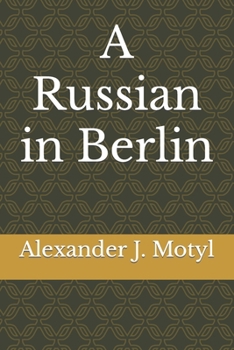A Russian in Berlin
A Russian in Berlin addresses a topic that few Germans and even fewer Russians like to address: the systematic rape by the victorious Red Army of 1.5 million German women in the summer of 1945. Germans avoid the topic because it makes them look like victims; Russians avoid the issue because it makes them look like perpetrators. Written in a straightforward reportorial style, A Russian in Berlin disabuses readers from believing that a simple presentation of the facts can resolve complex moral issues involving competing guilts. The novel is set in Berlin in 1975. Germany is on the front lines of the Cold War and in the throes of the Baader-Meinhof gang's terrorist violence. While at a conference in West Berlin, Harvard University's most prominent Russian historian is accused by five women (four of whom were Nazis) of having assaulted them in mid-1945. The historian admits to witnessing rapes and committing war crimes (he massacred hundreds of defenseless German soldiers), but is uncertain of having assaulted the women. Their accusations spark a series of soul-searching encounters in which Germans, Americans, and Russians ask whether the savagery of war exonerates soldiers of committing atrocities and whether an honest discussion of the Soviet mass rapes diminishes German guilt for the war and Holocaust. The explosive end suggests that the truth is never easily established and that complexity, ambiguity, deception, and nuance are inescapable-as well as inescapably unsatisfactory-features of human existence.
Format:Paperback
Language:English
ISBN:B09LGSH39C
ISBN13:9798766292579
Release Date:November 2021
Publisher:Independently Published
Length:166 Pages
Weight:0.51 lbs.
Dimensions:0.3" x 6.0" x 9.0"
Customer Reviews
0 rating





